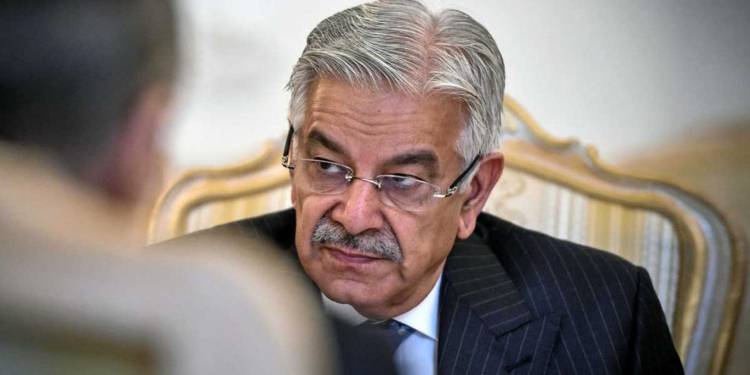
Pakistan Tehreek-e-Insaf (PTI) Chairman Imran Khan has been engaged in a "proxy war" since being removed from the position of prime minister, said Defence Minister Khawaja Asif.
The minister said on the Geo News program Capital Talk that Imran Khan has been engaged in a proxy war for one and a half years.
Asif said that the PTI chief was implementing an "Israeli agenda" in Pakistan and that Tel Aviv was concerned that its "agenda" was being thwarted there.
He said that the former prime minister, who was ousted from office by a vote of no-confidence in April of last year, wants Pakistan to stay unstable and that the PTI chief asks his followers to tweet in order to monitor the response of institutions.
Asif referred to the mayhem on May 9, when defense institutions were primarily attacked, saying, "They have targeted defense institutions only."
As Tel Aviv had recently targeted Pakistan during the presentation of the Universal Periodic Report of Pakistan at the United Nations Human Rights Council, the defense minister was drawing a connection between the previous prime minister and Israel. Pakistan received praise from several governments and civil society groups for its tremendous advancements in human rights, and the report was unanimously endorsed.
Pakistan criticized Israel for objecting to it, claiming that Islamabad thought that Israel's remarks in the UN Human Rights Council during Pakistan's UPR review process were made for political reasons.
The defense minister also stated that no choice had been made for the interim prime minister.
Earlier, Prime Minister Shehbaz Sharif had assured the nation that when his government term ended next month, the reins would be handed over to an interim setup.
The minister said on the Geo News program Capital Talk that Imran Khan has been engaged in a proxy war for one and a half years.
Asif said that the PTI chief was implementing an "Israeli agenda" in Pakistan and that Tel Aviv was concerned that its "agenda" was being thwarted there.
He said that the former prime minister, who was ousted from office by a vote of no-confidence in April of last year, wants Pakistan to stay unstable and that the PTI chief asks his followers to tweet in order to monitor the response of institutions.
Asif referred to the mayhem on May 9, when defense institutions were primarily attacked, saying, "They have targeted defense institutions only."
As Tel Aviv had recently targeted Pakistan during the presentation of the Universal Periodic Report of Pakistan at the United Nations Human Rights Council, the defense minister was drawing a connection between the previous prime minister and Israel. Pakistan received praise from several governments and civil society groups for its tremendous advancements in human rights, and the report was unanimously endorsed.
Pakistan criticized Israel for objecting to it, claiming that Islamabad thought that Israel's remarks in the UN Human Rights Council during Pakistan's UPR review process were made for political reasons.
The defense minister also stated that no choice had been made for the interim prime minister.
Earlier, Prime Minister Shehbaz Sharif had assured the nation that when his government term ended next month, the reins would be handed over to an interim setup.

